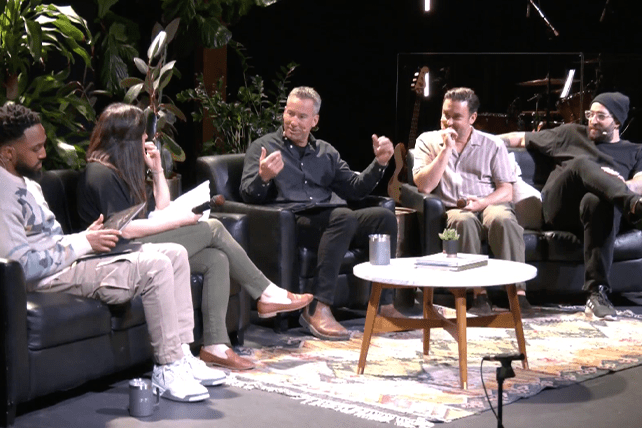Even still, Sprinkle said that he did not invite Whitaker to Exiles in Babylon to debate with him about LGBTQ+ inclusion “because even when we debate topics, it’s under the rubric of ‘these are orthodox doctrines,’ and I think affirming same-sex marriage is outside the bounds of orthodoxy.”
Notably, Sprinkle has written extensively in favor of traditional sexual ethics and is the co-founder and president of The Center for Faith, Sexuality & Gender.
Whitaker was not featured in the session titled “LGBTQ People and the Church.”
A Discussion About Women, Abuse, and Power
Perhaps the most emotionally charged session was “Women, Power, and Abuse in the Church,” during which author Laurie Krieg shared her harrowing story of sexual abuse she experienced as a child and how it has affected her faith.
“When I told my church community what had happened, they helped to make sense of it. ‘It’s your fault,’ they said,” Krieg recounted. Some suggested that Krieg must have sinned and that God sent an abuser to punish her. Internalizing this narrative led to anxiety and depression.
Through counseling, Krieg later discovered the practice of imaginative prayer, in which she invited Jesus into the experience of re-exploring her childhood trauma, visualizing him standing beside her.
“Then Jesus turned to the man who had hurt me. ‘Go,’ he said with peaceful authority. And both my abuser and the fake god in the corner disappeared,” she recounted.
“You can get through anything if you believe Emmanuel, God with us, feels it with you,” Krieg said. “He never wants abuse to happen to us. He took all the abuse for us. That is godly authority. Godly authority doesn’t sacrifice their lambs. Godly authority goes first and sacrifices themselves for the lambs.”
During the discussion that followed, Sprinkle asked the four presenters what they wished good men in the church would do to combat abuse.
“I wish good men, before an exterior endeavor of examining abuse of power, examined an interior place of power,” said author Tiffany Bluhm. “What is the intersection of your identity—your race, your class, your height, your physical stature—all those play into how women perceive you.”
She continued, “And so being able to access your own place, your own embodied power, before you do this work of dismantling a systemic abuse of power.”
Old Testament scholar Dr. Sandy Richter said she wants men “to recognize me for my gifts, not my gender.”
“I don’t want the first thing for people to see or think about me is that I’m female,” she continued. “I would like the first thing that people see and think about me is that I am a gifted member of the body of Christ who’s coming here to build the kingdom.”
Richter went on to recount her experiences in Christian academia and how she has often been ignored or intentionally kept out of certain professional situations to avoid the appearance of impropriety.
“I wish godly men and good men would believe women,” said Krieg. “It’s a slow, dripping grate on your soul to have people look at you all the time with suspicion.”
Clinical psychologist and author Dr. Juli Slattery said, “I think it costs a lot to believe women.”

